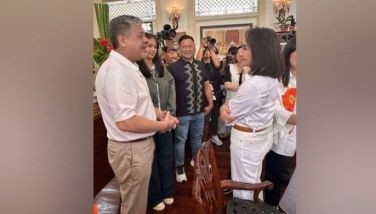The true and complete meaning of due process
With so many lawyers and Law professors that we have all around us, with the long array of Supreme Court jurisprudence on the matter, it is a source of too much wonder, if not some disappointment, that such a very common and popular term as "due process" remains totally misunderstood, and often undermined and violated. Last Sunday's Bar examinations, both in Political Law, in the morning and Labor Law, in the afternoon, found many Bar candidates at a loss on simple questions that call for a fundamental comprehension on the law and procedures relative to due process. In the Bill of Rights, in all our Constitutions, in 1935, 1973 and 1987, and even the Aguinaldo, the Malolos and Biaknabato charters, as well as the Japanese Constitution of President Laurel, the concept of due process is clear.
It is well-settled, both in our laws, and in international law, that no person shall be deprived of life, liberty and property without due process of law. Every person should be heard before he is being judged. He or she should be given a day in court, so to say. No one, not even the state and the government, has the power to deprive any person such a basic human right. All civilized governments and institutions are duty-bound to respect this fundamental right. In Labor Law, even the richest and most powerful among employers are not exempt from this very essential principle in labor laws. If we examine the many Court decisions that we have every so often, it becomes perplexing, that employers, workers, unions and arbitrators, even some magistrates do not have a clear and common understanding of the concept and principles on due process.
It is fortunate that in June this year, no less than the Supreme Court gave a long lecture on due process in the case of Unilever (GR 201701), invoking the 2007 precedent in King of Kings (GR 503 Phil 108). The Court had to tell employers to adhere strictly to Section 2, Rule XXIII, Book V, Rules Implementing The Labor Code. Every Law student knows that this rule is an amplification of Article 277 (b) of the Labor Code. There are only three steps to follow prior to termination of employment: First, management should give the employee a written notice specifying the charges against him. Second, the employee should be investigated formally after he submits a written answer to the charges. Third, after management shall have evaluated the evidence, both against and for the employee, a written notice of decision should be given to him, specifying the charges, the evidence, the company policy violated and the just cause committed.
The Highest Court clarified that the employee should be given at least five days, not 24, 48 or 72 hours like a military man, from the date he was given a written charge so as to allow him enough time to study the accusation against him, to consult a union official or a lawyer, to gather data and evidence in his favor, and to decide on what defenses to raise against the complaint. Management is mandated by law to accord to the employee all kinds of assistance he needs to prepare adequately for his defense. Moreover, in order to enable him to intelligently prepare for his defense, the notice of charge should contain a detailed narration of the specific events and circumstances that constitute the offense. The charge should not be generic or vague. It should specify the dates, the amount involved, if any and the witnesses who could shield light on the case. The charge should contain what specific rule was violated.
In the formal hearing and conference, maximum opportunity should be granted to the employee to be assisted by a representative or lawyer of his choice, if he so desires, to explain and clarify his defenses, to present evidences and witnesses in his favor, to rebut the evidence against him, and even to propose and negotiate for an amicable settlement of his case. In the Unilever case, the Court bewailed that management was not direct and specific in the charges poised against the employee since the accusation was couched in general terms. The Court considered that as a violation of due process. Questions may be asked why there is too much solicitousness for the offender. We should remember that the employee enjoys the presumption of innocence. He is not an offender until proven so by substantial evidence. The employer has the burden of proof. All doubts are resolved in favor of labor. And the State is mandated to afford full protection to labor. Management has all the money and influence to protect itself.
Of course, protection to labor does not authorize oppression of management. If labor is tainted or is guilty of fault, negligence or bad faith, and a worker comes to court not with clean hands, then justice demands that he should answer for all the consequences for his acts or omissions. But then again, until management is able to prove the worker's guilt, labor enjoys the full protection of the State. For the truism is: He who has less in life should have more in law. And one does not have to be a lawyer to appreciate that.
- Latest



















